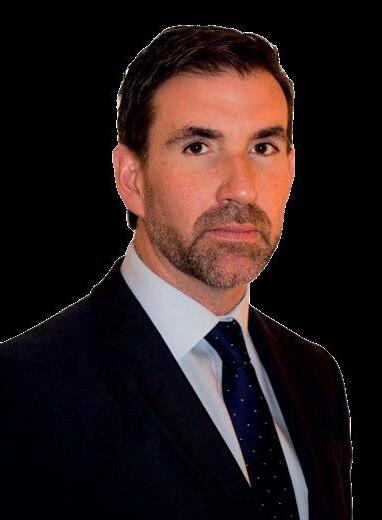
5 minute read
GUEST ARTICLES (cont.)
remained at +16.5, second only to North America at +16.7.
Central to this migration has been the influence of two key industry players in the region, the Dubai International Finance Centre (DIFC) and the Abu Dhabi Global Market (ADGM), each of which has its own financial laws and regulations. The former suggests that as many as 20 foreign hedge funds firms have set up in the DIFC over the past year with another 20 in the pipeline over the remainder of this year. The latter is also witnessing a lot of interest from foreign firms seeking a fund license.
The UAE leadership continues to forge ahead to establish the region as a global hub for digital assets. In 2018, the Financial Services Regulatory Authority of the ADGM became the first jurisdiction globally to introduce an implement a comprehensive and bespoke regulatory framework for the regulation of exchanges, custodians, brokers, and other intermediaries engaged in virtual asset activities. The rest of the UAE was quick to follow suit. Fast forward to February of last year where the Dubai government established the world’s first dedicated virtual assets regulator (the Virtual Asset Regulatory Authority or VARA) tasked with the regulation, governance, and assurance of licences for virtual asset regulated activities, including brokerage and asset management. Not to be outdone, the DFSA is also developing a framework to maintain oversight of the cryptocurrency and digital asset space.
AIMA is no stranger to the UAE, boasting members from across the region for several years. Recognising the buzz of activity with foreign firms migrating to the region, we have established a manager-only AIMA members’ network. This group will be a forum for peer-to-peer discussion, supporting members actively monitoring and advocating on a variety of proposed rules and guidelines as well as offering practical guidance that will enhance the operations of its alternative asset manager members in the
If you are an AIMA member operating in the UAE or are interested in what others are doing in the region, we would love to hear from you by contacting us on the following email address (info@aima.org).
Tom Kehoe Global Head of Research and Comms, AIMA




Presented by REGULATION
Criminal Insider Dealing Offence Updated

For the first time, exchanges based in the USA and Switzerland fall under the auspices of the UK’s criminal insider dealing regime.
New York Stock Exchange, NASDAQ and SIX Swiss Exchange were added to the framework due to the detection of a persistent trend of organised crime groups recruiting UK insiders to disclose inside information relating to securities traded on those exchanges.
The criminal regime, based largely on legislation that took effect in 1993, has lagged behind its civil regime equivalent, which was last substantively updated in 2016. Certain elements of the updates to the criminal regime, which took effect on 15 June 2023, seek to bring the criminal regime up-to-date, such as bringing multilateral trading facilities (“MTFs”) and organised trading facilities (“OTFs”) into scope and aligning the instrument types in scope. However, the inclusion of the aforementioned overseas exchanges means that the scope of the criminal regime goes beyond that of the civil regime.
Fca Proposes Amendments To Mifidpru
As part of its Quarterly Consultation, No 40, the FCA has proposed some clarifying amendments to the MIFIDPRU prudential regime. These relate to the ICARA and the own funds and liquid assets threshold requirements:
• Where a MIFIDPRU firm is also subject to another prudential regime, such as the AIFMD prudential regime, the own funds threshold requirement cannot be lower than the own funds requirement as prescribed by the other regime.
• When determining the liquid assets threshold requirement for wind-down, the basic liquid asset requirement should not be doublecounted.
• Additional guidance is provided for firms in investment firm groups when determining which aspects of the ICARA should be applied on an individual firm basis as opposed to applying to the group as a whole.
In addition, there are some minor amendments to the MIF007 – ICARA Questionnaire.
The consultation period is short (five weeks – until 10 July 2023) indicating that the handbook changes will be implemented in the near future.
ATTENTION 13F FILERS: A REMINDER THAT IT IS TIME TO KEEP TRACK OF PROXY VOTES ON EXECUTIVE PAY
Institutional investment managers who file a Form 13f with the SEC will need to collate its proxy voting record to disclose how they voted on executive compensation, or so-called “say-on-pay” matters.
The SEC will not require 13f filers to begin filing the new Form N-PX to disclose such data until August 31, 2024, but the filing will cover votes cast after June 30, 2023.
The Form 13f is a quarterly report filed by institutional investment managers who have discretion over $100 million or more of U.S. listed securities. The SEC publishes a quarterly list of Section 13f securities.
While registered investment advisers will already have to keep records of their proxy voting pursuant to Rule 206(4)-6 of the Investment Advisers Act of 1940, as amended, the Form N-PX will be a new filing obligation via EDGAR.
Sec Releases Risk Alert On Marketing Rule
The SEC’s Division of Examinations (the “Division”) published a Risk Alert informing registered investment advisers of additional areas of focus for exams based on the new Marketing Rule.
The Division continues to focus on a firm’s policies and procedures, the substantiation requirement, performance advertising requirements and books and records.
Additional areas of emphasis include:
• Testimonials and endorsements
• Third-party ratings
• Form ADV
These Risk Alerts are published to encourage advisers “to reflect upon their own practices, policies, and procedures and to implement any appropriate modifications to their training, supervisory, oversight and compliance programs”. The Division encourages advisers to review their websites and other marketing materials for compliance with the Marketing Rule.
Sec Charges Private Equity Fund Adviser For Overcharging Fees And Failing To Disclose Conflict Of Interest
The SEC charged a New York-based private equity fund adviser with charging excess management fees and failing to disclose to investors a conflict of interest relating to its fee calculations.
The SEC’s order found that the firm’s offering documents for certain funds it advised allowed for management fees to be charged based on invested capital in individual portfolio investments and required a reduction in the basis for these fees if said portfolio investments suffered permanent impairment.
From August 2017 through April 2021, the firm charged excess management fees by calculating fees based on aggregated invested capital at the portfolio company level rather than at the individual portfolio investment level.
In addition, the firm did not disclose its criteria for determining any permanent investment impairments. Investors were unaware that the criteria used by the firm were “narrow and subjective, making them difficult to satisfy”. This undisclosed conflict of interest allowed the firm significant latitude in determining whether or not an asset would be deemed permanently impaired.
The adviser consented to the entry of the SEC’s order finding that it violated Sections 206(2) and 206(4) of the Advisers Act and Rules 206(4)-7 and 206(4)-8 thereunder. Without admitting or denying the SEC’s findings, the firm agreed to a cease-and-desist order and censure and to pay a $1.5 million penalty and approximately $865,000 in disgorgement and prejudgment interest.








